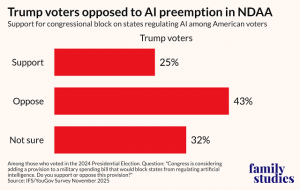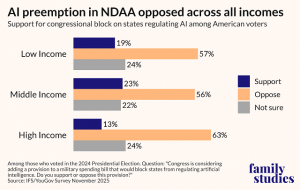New Poll Shows Americans Overwhelmingly Oppose Federal Preemption of State AI Regulations
Bipartisan Opposition Emerges Across All Demographics as Congress Considers Adding AI Provision to National Defense Authorization Act
CHARLOTTESVILLE, VA, UNITED STATES, November 21, 2025 /EINPresswire.com/ -- American voters oppose adding artificial intelligence preemption provisions to the National Defense Authorization Act by a decisive 3-to-1 margin, according to a new YouGov poll conducted by the Institute for Family Studies. The survey reveals that 57% of Americans oppose congressional efforts to block states from regulating AI through military spending legislation, while only 19% support such measures.The polling comes as House Majority Leader Steve Scalise has indicated interest in incorporating AI preemption language into the forthcoming NDAA, despite the provision's overwhelming 99-1 defeat in the Senate earlier this summer. The White House has also signaled support for federal preemption, with a leaked draft executive order reportedly directing agencies including the Department of Justice and Federal Trade Commission to challenge state AI laws.
KEY FINDINGS:
• Bipartisan Opposition Spans Party Lines: The poll reveals significant resistance to AI preemption among both major party voters. Among Trump voters, 43% oppose the measure compared to just 25% who support it, with 32% remaining unsure. Opposition is even stronger among Harris voters, with 70% against the provision and only 14% in favor. The data demonstrates that blocking state-level AI regulation remains unpopular across the political spectrum.
• Income Levels Show Consistent Rejection: Majorities in every income bracket oppose federal preemption of state AI laws, indicating that concerns about AI regulation transcend economic divisions. The uniform opposition across income groups suggests Americans of all economic backgrounds want to preserve state authority to establish AI safeguards.
• Younger Americans Lead Opposition Despite Higher AI Usage: When broken down by age, every demographic group showed majority opposition to the NDAA provision. Most notably, voters aged 18-34 demonstrated the strongest resistance, with 61% opposing the measure and only 22% supporting it. This finding is particularly significant given that younger Americans are the most familiar with AI technology and most likely to use it regularly, according to Pew Research Center data.
This marks the third Institute for Family Studies poll confirming widespread public opposition to AI preemption efforts. A June survey found Americans opposed AI regulation moratoriums by a 3-to-1 margin, while a September poll revealed voters want Congress to prioritize child safety protections over AI industry advancement by an extraordinary 9-to-1 margin.
"Americans support innovation, but they are unwilling to sacrifice family and community wellbeing for technological advancement. The persistent opposition across multiple surveys, demographic groups, and political affiliations establishes that blocking state-level AI regulation remains deeply unpopular with the American electorate," says Michael Toscano, Senior Fellow at the Institute for Family Studies.
The Institute for Family Studies calls on policymakers to respect democratic principles by crafting bipartisan AI legislation that reflects popular support rather than pursuing measures voters have repeatedly rejected.
About the Survey: The poll was conducted by YouGov in partnership with the Institute for Family Studies. Complete methodology and sample demographics are available upon request.
Contact:
Institute for Family Studies
media@ifstudies.org
ifstudies.org
x.com/famstudies
About the Institute for Family Studies
The Institute for Family Studies is a nonpartisan research organization dedicated to strengthening marriage, family life, and the wellbeing of children through rigorous social science research.
Christopher Bullivant
Institute for Family Studies
media@ifstudies.org
Visit us on social media:
LinkedIn
Facebook
YouTube
X
Legal Disclaimer:
EIN Presswire provides this news content "as is" without warranty of any kind. We do not accept any responsibility or liability for the accuracy, content, images, videos, licenses, completeness, legality, or reliability of the information contained in this article. If you have any complaints or copyright issues related to this article, kindly contact the author above.




